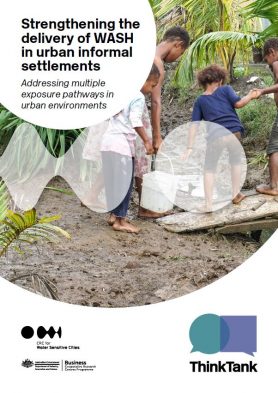Strengthening the delivery of WASH in urban informal settlements: addressing multiple exposure pathways in urban environments
Delivering water and sanitation services to people living in informal settlements at the edges of cities and towns is complex. This new thought piece from the CRC for Water Sensitive Cities ThinkTank calls for an holistic approach to providing water and sanitation services in these settlements.
Often, the centralised (networked) approach will take decades to reach these settlements—if at all. At the same time, evidence suggests many of the non-networked, decentralised or community based approaches may not be producing the health and environmental outcomes we desire in the urban 21st century.
So, to leave no-one behind and reach first those who are furthest behind, the paper proposes an holistic approach to ensure:
- safely managed sanitation
- flood management and mitigation
- improved environmental quality
- multiple fit-for-purpose water sources
- good hygiene behaviours and practices.
It advocates using a combination of interventions that account for context-specific factors at a range of scales. These context-specific factors include population and housing density, pathways for faecal contamination, and exposure to flooding.
The paper incorporates the views of experts from the CRCWSC, Monash Sustainable Development Institute, Emory University (USA), Stanford University (USA) and the World Bank. We thank them for their time and considered views about ways to produce better amenity, health and environmental outcomes for people living in urban informal settlements. The CRCWSC also acknowledges support from the Australia Government Department of Foreign Affairs and Trade in producing the paper.
